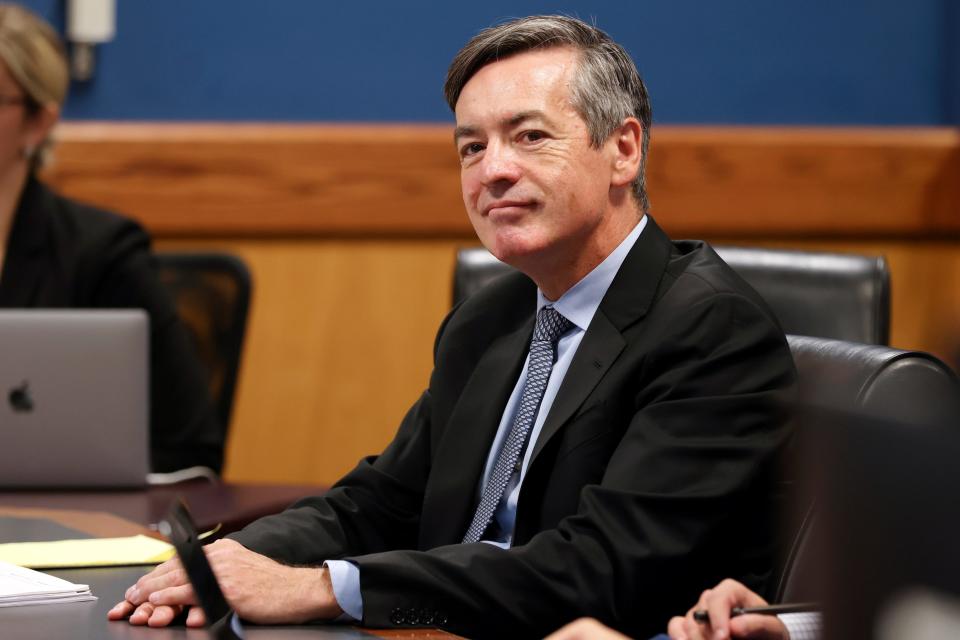Kenneth Chesebro, a Donald Trump co-defendant in Georgia, pleads guilty in election conspiracy case
Kenneth Chesebro, a co-defendant with Donald Trump in the Georgia election conspiracy case, on Friday became the third person to plead guilty to a felony in the conspiracy to interfere in the 2020 election.
Chesebro, a lawyer who advised the Trump campaign, was initially charged as part of the broader racketeering conspiracy with developing the plan for fake presidential electors to support Trump despite him losing the state to President Joe Biden. He faced the overall racketeering charge and a half-dozen charges dealing with fake electors.
Chesebro, whose trial was scheduled to begin Monday, pleaded guilty to a single charge of conspiracy to commit filing false documents. He agreed to serve five years on probation, pay a $5,000 restitution and testify against others in future cases. His agreement fell under Georgia's First Offender Act, which will clear his record if he successfully completes his probation.
"Guilty," said Chesebro, whose trial was scheduled to begin Monday.
Fulton County Superior Court Judge Scott McAfee found a factual basis for the charge and accepted the plea as provided voluntarily and intelligently.
"I just wanted to thank you for the way you've handled these proceedings," Chesebro said.

Chesebro agreed to remain in Atlanta for several days to iron out the logistics to serve his probation in Puerto Rico, where he lives. He is expected to complete his probation in three years under customary rules for good behavior, his lawyer Scott Grubman said.
Daysha Young, the executive district attorney in Fulton County, described Chesebro's offenses as creating and distributing false documents in Georgia and other states for people to submit to the National Archives and Congress. "The defendant provided detailed instructions to co-conspirators in Georgia and other states for creating and distributing these false documents," she said.
Trump and one of his personal lawyers, John Eastman, asked the Republican National Committee to recruit fake electors in Georgia and other states, Young said. Another lawyer, Rudy Giuliani, asked people to serve as fake electors and "provided strategic instructions" to co-conspirators about executing the plan, Young said.
Sixteen co-defendants in the case, including Trump, Eastman and Giuliani, have pleaded not guilty.
Legal experts said the co-defendants reaching plea agreements could provide powerful testimony during trials because they met with key players in the alleged racketeering conspiracy that sought to keep Trump in power.
Chesebro was one of 19 co-defendants charged in the case, which alleged a broad racketeering conspiracy. The indictment described a conspiracy that included the recruitment of fake presidential electors to vote for Trump, lying about election results to state officials and in court records, and soliciting public officials to violate their oaths of office.
Two other co-defendants have already pleaded guilty. Sidney Powell, another lawyer who baselessly claimed widespread election fraud, pleaded guilty Thursday to one count of conspiracy to commit theft by taking and five counts of conspiracy to commit intentional interference with performance of election duties. Powell agreed to testify in future trials in exchange for serving six years of probation, a $6,000 fine and paying restitution of $2,700.
Another co-defendant, bail bondsman Scott Hall pleaded guilty last month to five misdemeanors and also agreed to testify against others.
Chesebro wrote a series of memos explaining how Trump electors in Georgia and other states could meet and cast votes for Trump despite his losses in those states. But he acknowledged the strategy was “somewhat dicey” in Georgia because of state requirements.
The strategy divided Trump campaign lawyers. Justin Clark, Trump’s deputy campaign manager and senior counsel, told House investigators he had “real problems with the process” and “got into a little bit of a back and forth” with Chesebro.
Besides the racketeering count, Chesebro was charged with six conspiracy counts dealing with forgery and false documents for the fake electors. The indictment detailed steps he took allegedly as part of the conspiracy:
Dec. 10 he sent an email to David Shafer, chairman of the Georgia Republican Party and one of the fake electors, saying the Trump campaign asked him to “help coordinate” logistics of electors voting. Chesebro sent Shafer an email that day with attached documents for casting electoral votes.
Dec. 13 he sent Trump lawyer Rudy Giuliani an email outlining strategies for disrupting and delaying the Jan. 6, 2021, session of Congress to count electoral votes. Chesebro said the strategies were “preferable to allowing the Electoral Count Act to operate by its own terms.”
Dec. 13 he sent an email to Mike Roman, a Trump campaign aide, with attached documents for Trump electors to use in Georgia and other states. Chesebro sent another email Dec. 13 to Roman saying Giuliani “wants to keep this quiet until after all the voting is done,” according to the indictment.
This article originally appeared on USA TODAY: Kenneth Chesebro, charged with Trump over fake electors, pleads guilty